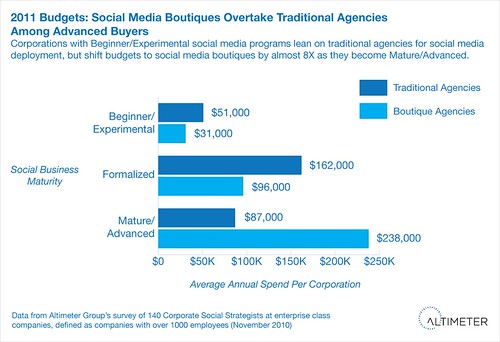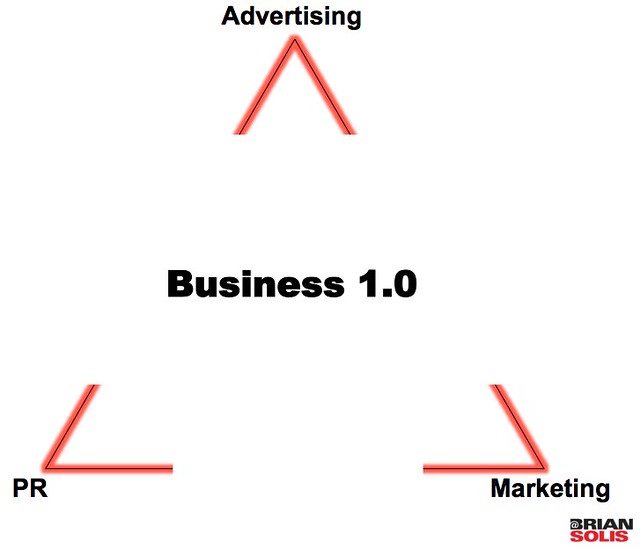Jeremiah Owyang, industry analyst at Altimeter Group, published a report that sent shock waves throughout the global creative industry. For large agencies, it represented a harbinger of change. For specialized groups, the report was a declaration of validation.
In his report, “How Social Media Boutiques are Winning Deals Over Traditional Digital Agencies,” Owyang documents the disruption facing traditional agencies. For those businesses already advanced in social media strategies and needs, budgets are turning to boutique shops as much as 8x over traditional agencies.

This isn’t just about agencies and creative professionals. The future of business is tied directly to the C-suite, including CEOs, COOs, CMOs, CSOs, CFOs, and everybody who reports to them.
Social Media are often underestimated and a Facebook Brand Page, Twitter profile, and blog are simply extensions of deeper engagement strategies that require definition. Looking beyond the 3F’s of friends, fans, and followers, businesses must also build an inbound infrastructure that supports outbound activity. And what brand managers will usually find upon experimentation, is that the online consumers represent a myriad of distinct audiences, not just one receptive to creative marketing. The Last Mile of business requires the recognition and engagement of social consumers and a genuine, yet sophisticated approach.
Enter Hybrid Theory…
As we witnessed with the rise of digital agencies in Web 1.0, agencies of all shapes, sizes, and focus will need to expand services once consolidation escalates. There’s a lot to learn and the needs of even the most savvy businesses have not yet fully materialized.
The Hybrid Theory Manifesto represents nothing less than the future of marketing and the socialization of business. It’s designed to introduce continuum and collaboration into complementary strategies that steer inbound and outbound experience. And yes, customer service is marketing. As you’ll find, not only will the creative process change, but the systems, methodologies, and supporting resources require transformation and evolution as well. It’s digital Darwinism and those who attempt to stuff maturing needs of social consumers into outdated operations will risk extinction. Sometimes, necessity is the mother of reinvention.
Please take a moment to read…and share your thoughts.
The Hybrid Theory Manifesto: The Future of Marketing, Advertising, and Communications
Part One: Introducing the Fifth P of the Marketing Mix…People
Part Two: Looking Beyond Madison Ave…shifting from campaign to continuum
Part Three: Hybrid Theory Explained
Connect with Brian Solis on Twitter, LinkedIn, Facebook
![]()
___
If you’re looking for a way to FIND answers in social media, consider Engage!: It will help…

___
Get The Conversation Prism:








I’m not sure your predictions are right, or maybe I didn’t read them right. I believe that online marketing (digital presence) will be a powerful trend of 2011, especially where mobile devices are concerned.
I think we are in agreement…what I’m saying however, is that these presences won’t operate in silos any longer.
I think we are in agreement…what I’m saying however, is that these presences won’t operate in silos any longer.
I think we are in agreement…what I’m saying however, is that these presences won’t operate in silos any longer.
I like the way you phrased this, Brian. Hybrid theory is about the different practices coming together to complement one another. It’s not about everything being meshed into one super-practice.
Indeed Zach. Thank you.
Brian, I have been reading your blog for sometime now and for the most part, I agree with where you are coming from. However, how do you propose getting marketing/PR/media/customer service departments & their various agency partners in large corporations to see the value of this and actually work together instead of in silos?
agreed..
Very interesting predictions and I believe you’re right Brian. It’s all about integration & engagement and it’s shocking how so many brands & ad agencies seem to have been neglecting this, especially integrating customer service with all the other marcoms and digital tools.
Hey Brian — Like the theory, but not sure I’m totally on board. I look at these (and other) disciplines as entirely interdependent. Agree that you can’t really lump them all into one, but would argue for an uber circle above or around this Venn diagram for “Brand.”
Rick, this is the world in which I live. Marketing runs a contest…Advertising runs a new campaign…both point to Facebook and nether are in sync. Then customers respond with problems and ideas to one or the other asking for help or offering advice…but neither can respond. Engagement and growth opportunities are lost. The list goes on and on.
I’m not saying they all need to be “one,” but they do need to open doorways between them. And professionals working within each discipline require new skillsets that facilitate external and internal collaboration.
The integration of functions has been going on for a while now. Only internal people still see the need to separate what they do so that they can have a job. Target markets have moved beyond that and see companies as they truly are, a single entity regardless of the tool used to communicate.
I would replace ‘Advertising’ above with ‘sales’ and urge marketers to focus on their customers’ buying cycle rather than their own internal sales cycle. It also seems that PR is winning the battle as long as ‘P’ equals ‘ Public’ and expand beyond the media to include all stakeholders (an old concept is here is one.) Today’s marketing, sales, advertising or PR is all about creating relevant content and diffusing it wherever the market is. That content is sometimes clever, sometimes boring, but always relevant to the end-user.
We truly do live in interesting times…
And where does sales and distribution come in?
Hi Jerry, here…in the discussion about the socialization of business, I suggest it here: https://www.briansolis.com/2010/11/it-takes-a-human-touch-no-really/
It’s all going to far more horizontal rather than vertical – I do wonder whether astroturfing and similar dodgy practises will become more prevalent as businesses seek to control what’s said about them.
Mobile interactive marketing will be the next BIG THING, if and this is essential the customer is actively involved and is allowed to play the role of the co-creator of the services and products!
Nicely done, Brian. I like the term very much and see it…as you said…as “validation” we’re moving in the right direction.
Lorrie Morgan-Ferrero
Encore de la branlette.
The old model has always been wrong, social media is just delivering the proof.
I would say it was more Doolittle-ism than Darwinism. Finally business can hear what the public are saying.